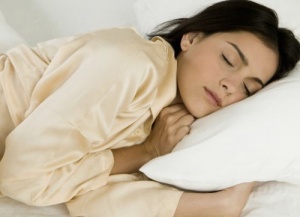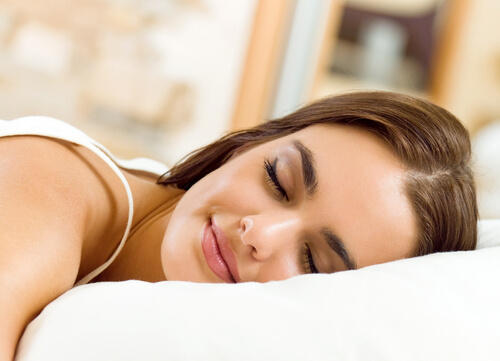Benefits of Sleeping on the Left Side of Your Body


Written and verified by psychologist Valeria Sabater
What side of the body do you usually sleep on? On the right or the left? Or are you one of those people sleeps facing up? Experts say that sleeping on the left side of your body is actually best for your health. Read on to learn why!
5 benefits of sleeping on the left side of your body
Did the title of this article surprise you? Until now, you might never have stopped to think about whether sleeping in one position or another could be better or worse for you. Well, it looks like it really is important.
Honestly, Eastern medicine has been telling us for a long time that we should all be sleeping on the left side of our body. Plus, in a recent study published in The Journal of Clinical Gastroenterology, Dr. John Doulliard explains a few simple principles to explain why this is the case.
We’re going to give you a short summary so that you can put his advice into practice. We’re confident you’ll be convinced.
1. For proper lymphatic drainage
Dr. Doulliard says that sleeping on the left side of your body is the most natural position. It’s the dominant side of the lymphatic system. The lymphatic system carries important elements like proteins, glucose, metabolites and any other elements that need to be filtered by the lymph nodes.
Well, this system also drains on the left side. But that’s just the first reason to sleep on the left side of your body.
2. For anatomical reasons
You may not know this, but both the stomach and the pancreas are more on the left side of the body. If you sleep on this side, you’re helping your body digest better. It helps your stomach channel its gastric juices and helps your pancreas secrete important enzymes.
So, it helps your digestion progress little by little, instead of all at once, which is what happens if you sleep on your right side.
You might like:
3. For your heart health

It’s also good to keep in mind that the aorta exits your heart making an arc to the left to reach the abdomen. So, if you sleep on the left side, it will help your heart work better, pumping blood more readily. That sounds good, doesn’t it?
4. Do you take naps?
If you’re a big napper, or just feel like you need to after eating a lot, then remember to sleep on your left side. This is good for your digestion and you’ll get up more alert, less tired, and without a stomach ache. Try it out and see how good you feel after a short nap on the left side of your body.
Read more:
5. For your spleen health

The spleen is also on the left side of the body. This organ is also a basic part of the lymphatic system, because its job is to filter the blood.
If you sleep on the left side of your body, you’ll help direct fluids to the spleen in a simpler way, which is good for your body’s natural sense of gravity. The lymphatic system does most of its work on this side.
So now you know, it’s best for your health to sleep on the left side of your body as often as you can. How about trying it tonight?
All cited sources were thoroughly reviewed by our team to ensure their quality, reliability, currency, and validity. The bibliography of this article was considered reliable and of academic or scientific accuracy.
- Hoque, E., Dickerson, R. F., & Stankovic, J. A. (2010). Monitoring body positions and movements during sleep using WISPs. https://doi.org/10.1145/1921081.1921088
- Jarus, T., Bart, O., Rabinovich, G., Sadeh, A., Bloch, L., Dolfin, T., & Litmanovitz, I. (2011). Effects of prone and supine positions on sleep state and stress responses in preterm infants. Infant Behavior and Development. https://doi.org/10.1016/j.infbeh.2010.12.014
- Victores, A. J., Hamblin, J., Gilbert, J., Switzer, C., & Takashima, M. (2014). Usefulness of sleep endoscopy in predicting positional obstructive sleep apnea. Otolaryngology – Head and Neck Surgery (United States). https://doi.org/10.1177/0194599813517984
- Person, E., Rife, C., Freeman, J., Clark, A., & Castell, D. O. (2015). A Novel Sleep Positioning Device Reduces Gastroesophageal Reflux. Journal of clinical gastroenterology, 49(8), 655-659.
- Dantas, R. O., & Aben-Athar, C. G. (2002). Aspects of sleep effects on the digestive tract. Arquivos de gastroenterologia, 39(1), 55-59.
- Leung, R. S., Bowman, M. E., Parker, J. D., Newton, G. E., & Bradley, T. D. (2003). Avoidance of the left lateral decubitus position during sleep in patients with heart failure: relationship to cardiac size and function. Journal of the American College of Cardiology, 41(2), 227-230.
- Penzel, T., Möller, M., Becker, H. F., Knaack, L., & Peter, J. H. (2001). Effect of sleep position and sleep stage on the collapsibility of the upper airways in patients with sleep apnea. Sleep, 24(1), 90-95.
- Lee, H., Xie, L., Yu, M., Kang, H., Feng, T., Deane, R., … & Benveniste, H. (2015). The effect of body posture on brain glymphatic transport. Journal of Neuroscience, 35(31), 11034-11044.
This text is provided for informational purposes only and does not replace consultation with a professional. If in doubt, consult your specialist.








